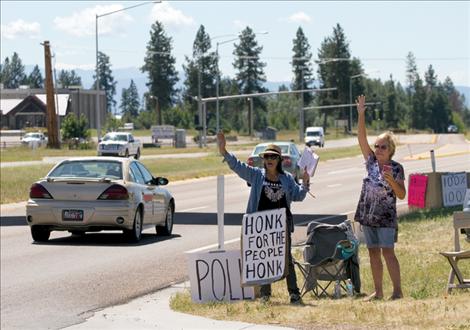Tribes to disperse Nez Perce settlement monies Sept. 12
Hey savvy news reader! Thanks for choosing local.
You are now reading
3 of 3 free articles.
FLATHEAD RESERVATION — Enrolled members of the Confederated Salish and Kootenai Tribes will each get a $10,000 check on Sept. 12, after the tribes were among 41 tribal nations to receive a settlement payment from the U.S. government earlier this year. On April 11, the federal government announced that Nez Perce Tribe, et al, v. Kenneth L. Salazar, Secretary of the Interior, et al, had been settled by agreement, and as one of the plaintiffs, the CSKT would receive $150,126,000. The 41 tribes involved in the case sought to hold the U.S. Department of the Interior accountable for mismanaging tribal assets and resources, as well as reconciliation for the mismanagement.
Six months after the settlement announcement, which CSKT Chairman Joe Durglo called “a positive moment in a long and sometimes contentious history with the federal government,” about half of the $150 million is set to be distributed to tribal members on Sept. 12. An open letter from Tribal Council to tribal members published Aug. 16 said the council was deliberating how to use the remaining money.
“When we have a plan, we will notify everyone,” the letter stated.
CSKT spokesman Rob McDonald confirmed the council has not made an official decision on the issue, although plenty of rumors are flying about possible courses of action, including the possibility of using the money to help purchase Kerr Dam. Such talk should be taken with a grain of salt, McDonald emphasized.
While some tribal members have voiced disapproval of the council’s decision to pay only part of the settlement money to individual tribal members, McDonald noted the decision was not taken lightly. From April to August, the council held public meetings in each of the eight voting districts on the reservation to hear concerns and collect comments on the matter from tribal members.
“Council’s decision to take this action was an effort to strike a balance between helping people cope with tough economic times, as well as planning for the long-term economic future of the tribal government, which supports the membership,” McDonald said.
And it wasn’t just those in government who thought the money would be managed best through a partial payout, he added.
“Council has been getting feedback of all kinds,” McDonald noted.
Council has also been drawing a lot of heat from tribal members who say they want 100 percent of the settlement monies distributed to individual members. A group called “The People’s Voice” spent a full week demonstrating in front of CSKT headquarters in Pablo, collecting signatures from tribal members in favor of a “100-percent payout.” After more than 1,300 tribal members signed the poll, the People’s Voice began circulating a petition last Friday that will be sent to the Bureau of Indian Affairs’ Portland, Ore., office and copied to its Washington, D.C., headquarters. The goal of the petition is not to disrupt the Sept. 12 payout, but to ensure the remaining settlement money goes directly to tribal members, according to People’s Voice advocate Revan Rogers.
The group as a whole was formed to bring attention to what members feel is a lack of transparency in tribal government.
“Our goal is not necessarily the money part of it,” explained Charlo resident Sharon Rosenbaum. “We want to have a voice in the government part of it … I think the main purpose is to have a working relationship with the Tribal Council, who we voted in. There should be transparency.”
What many people don’t understand, according to McDonald, is that this court case dealt with mismanaged lands and resources belonging to tribal nations, not individual tribal members, as in the famous case of Cobell v. Salazar.
“This is distinctly different because Cobell is about individual Indian monies (and resources),” McDonald explained.
Native American activist Elouise Cobell sued the U.S. government on behalf of more than 500,000 individual Indians, and a $3.4 billion settlement agreement was reached in that case in December 2009. That settlement money has not yet been paid by the federal government.
There are approximately 7,800 enrolled members of the CSKT, with about 5,000 living on the Flathead Reservation.

















